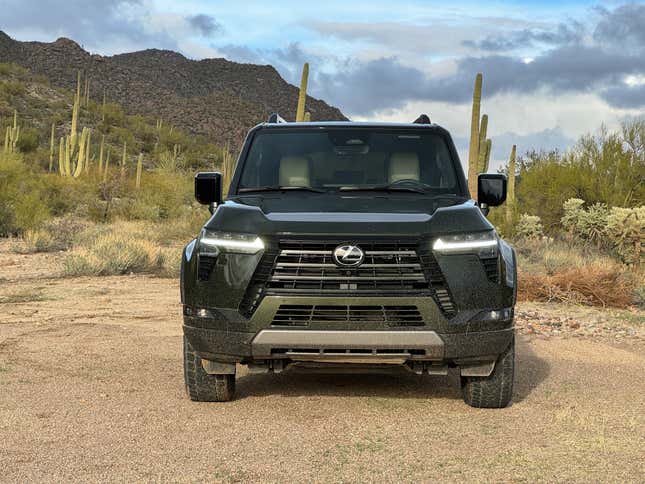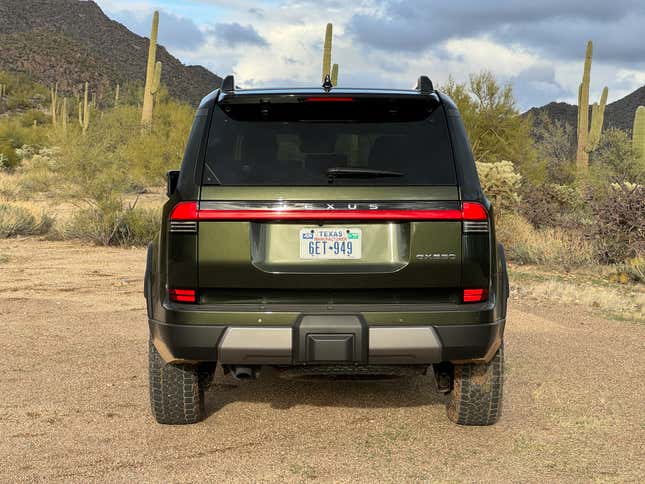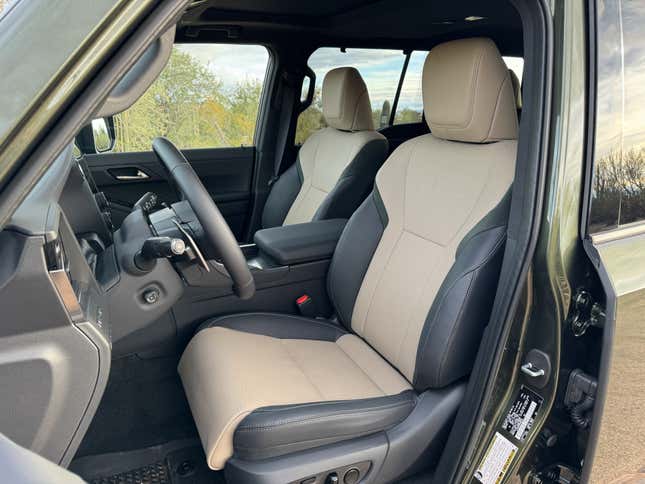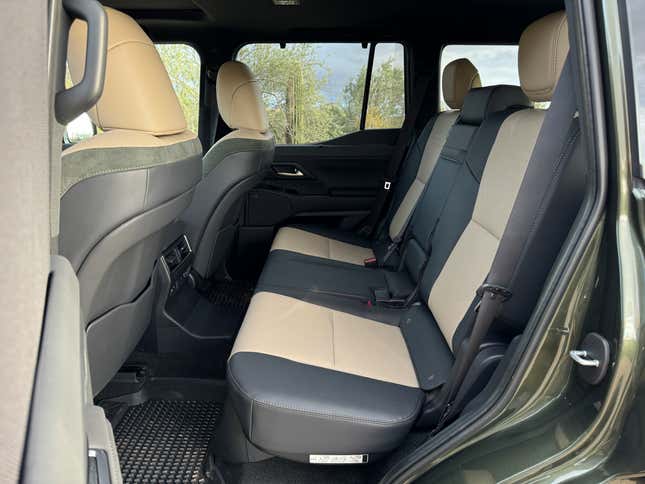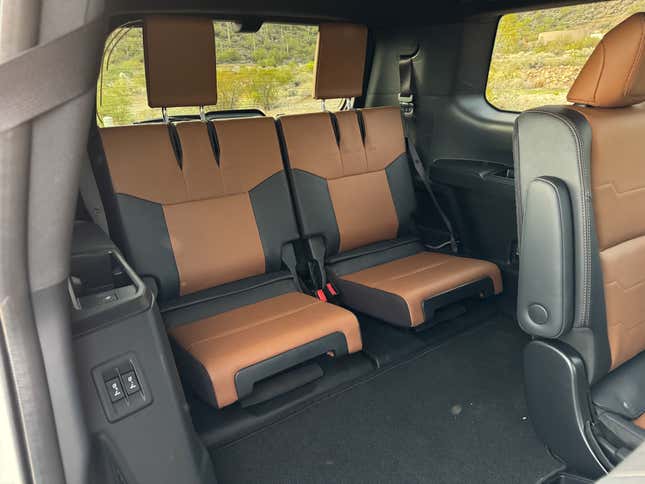I’ve never been a modern Toyota Land Cruiser guy, and by extension the Lexus LX and GX have never really done it for me either. I’ve always understood the appeal, but personally I like my high-end SUVs to be less simple and rugged and more interesting and luxurious, plus the 13-year-old GX has been seriously outdated for too long. My mind started changing when Lexus unveiled the third-generation GX and its Land Cruiser Prado sibling last year — I fell in love, at least on the styling front, and the specs and features seemed promising. But would the driving experience measure up?
Well folks, after getting to drive the new GX both on the road and off of it, I have good news. At long last Lexus has nailed the trifecta of style, luxury and capability with the 2024 GX 550. Not only does the redesigned GX hold greater appeal for Lexus’ longtime customers, it will be even more appealing to new customers. Most importantly, I freakin’ loved it.
Full disclosure: Lexus flew me out to Tucson, Arizona, and put me up in a very nice hotel in the desert for two nights so I could drive the new GX. I ate some pretty good food and got to see lots of cute wildlife, and I successfully avoided touching any cacti.
The new GX looks, in a word, badass. The frumpy, kinda swoopy styling of the outgoing GX is gone in favor of a super boxy, upright look. Shorter overhangs and better proportions mask an increase in size — the GX has grown by 2.8 inches in length, 3.7 inches in width and 1.4 inches in height, and the new GX’s wheelbase is 2.4 inches longer. The GX is a masterclass in surfacing, with wonderfully chamfered edges that catch the light, a strong shoulder line and squared-off fender flares. It successfully maintains the Land Cruiser and GX lineage while looking totally fresh and unlike anything else on the road.
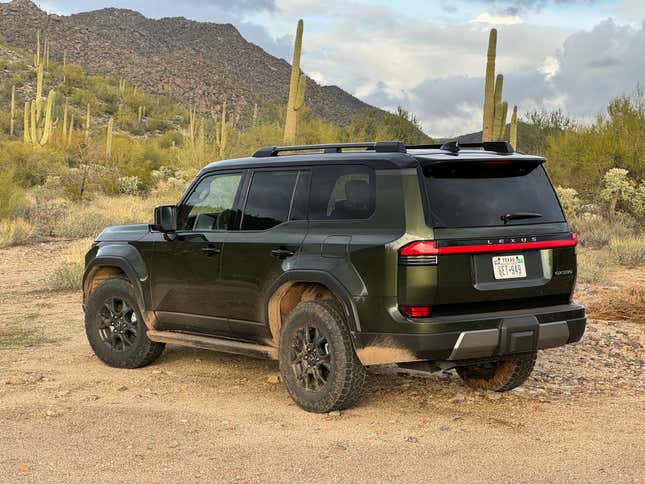
The GX wears one of the best versions of Lexus’ front-end language yet, with a blocky spindle grille and horizontal multibeam LED headlights that are mounted as high up as possible to aid in water fording. The rear taillight bar is also high-mounted for better visibility while off-roading, though the actual brake lights themselves are weirdly tiny. Instead of the old swing-out tailgate Lexus gave the GX a traditional top-hinged power tailgate, the result of direct customer feedback — the swinging gate was too heavy and obnoxious when parked on a curb, and GX owners wanted the cargo area to be easier to tailgate out of. The rear window opens separately, too.
There’s only one major shortcoming of the GX’s design, and luckily it’s an easy fix: all of the wheel options are ugly. The six-spoke 18-inch wheels you get with the Overtrail are okay if boring, but the 20s and 22s that come with the other trim levels all look far too dinky and spindly against the GX’s body. Like with the old GX, the wheels also look too tucked-in despite the new model’s wider track. The aftermarket will certainly be able to help, but the GX’s stock wheel designs seem like a weird miss and an afterthought.
A Legitimate Luxury Experience
Finally, the GX’s interior is worthy of its luxury price and branding. It’s very well put together, and while there are nice soft-touch materials in the right places the GX’s cabin still feels rugged enough that you wouldn’t feel bad getting it dirty. Upper trims get leather upholstery while others have a mix of suede and Lexus’ NuLuxe artificial leather material, and the latter doesn’t feel cheap.
Most trims come standard with three rows of seats and the option of second-row captain’s chairs, and the third row is more than spacious enough for my 5’9” frame. Headroom is improved for all three rows, and the second and third rows of seats have 2.6 and 8.6 inches more legroom, respectively. Cargo space with the third row in place is slightly down, and same goes for behind the second row, but overall cargo volume behind the first row of seats is up by more than 12 cubic feet. In all but the base trim the third row is power-folding, and the second row is easy to manually fold and slide forward for third-row access.
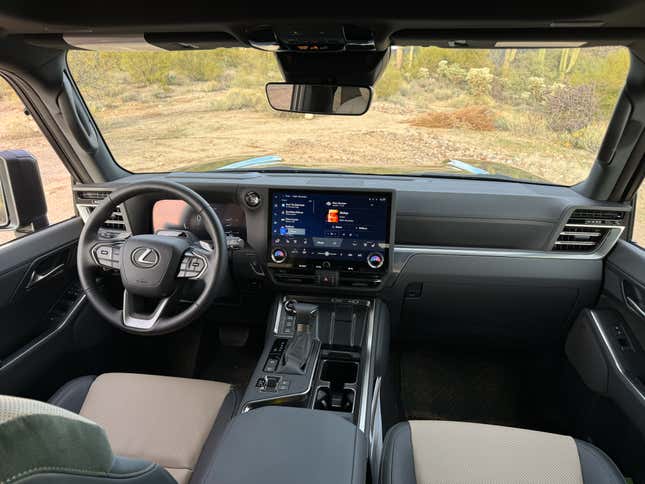
A 14-inch touchscreen and 12.3-inch digital gauge cluster are standard on every GX, and yes, there are knobs for volume and temperature controls, as well as easy-to-access shortcuts on the center screen for things like seat heaters and other climate functions. Lexus’ designers made sure the screens didn’t poke above the top of the dash and the plastic surround that connects the two together looks better in person. Wireless Apple CarPlay and Android Auto come standard, as does navigation, multiple USB-C ports and a Wi-Fi hotspot. Available tech features include a head-up display, themed ambient lighting, a digital rearview mirror, excellent massaging seats, and an absolutely bangin’ 21-speaker Mark Levinson sound system.
There are a few annoying ergonomic issues. The cargo cover mounts just behind the second-row seats; if the third row is up you can’t remove it from the cargo area, and it’s a pain to take out if you go in from the rear doors. You also can’t raise or lower the third row if the cover is in place. While the cupholders are nicely sized there’s not a lot of center console storage, and the 12v outlet takes up a weird amount of space. Every trim level has some sort of running board as standard, and they’re all pretty useless to me, except the power-folding ones fitted to the top trim level. (All the non-powered boards can be easily removed by the owner and replaced with rock rails, at least.)
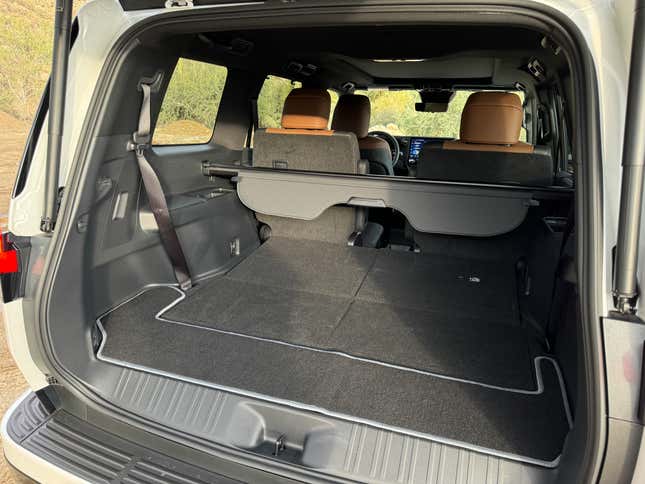
Under the hood of the GX 550 is the same twin-turbo 3.4-liter V6 that’s found in the Lexus LS and LX, as well as the Toyota Tundra and Sequoia. In the GX it makes 349 horsepower and 479 pound-feet of torque, a major improvement over the 301 hp and 329 lb-ft of the outgoing GX 460’s 4.6-liter V8. Attached to the V6 is a 10-speed automatic, a huge step up from the old GX’s ancient 6-speed auto, and the GX has full-time four-wheel drive.
Other than its potential for sounding awesome with a tuned exhaust, there’s no reason to miss the old GX’s V8. The new GX 550’s powertrain is lovely, with loads of torque at low speeds and plenty of freeway passing power — Lexus claims a 0-to-60-mph time of 6.5 seconds regardless of trim, which is more than a second quicker than the outgoing model. Shifts are so smooth that I barely even noticed them most of the time, and the V6 sounds good under hard acceleration. (It will also take kindly to aftermarket exhaust, I’m sure.)
Just don’t expect the move to turbos and fewer cylinders to make a big difference at the pump. EPA estimates aren’t out yet, but Lexus is targeting 17 mpg combined, 15 mpg city and 21 mpg highway, improvements of just 1 mpg combined and 2 mpg on the highway. Lexus says a hybrid powertrain will come to the U.S. after launch, using the same setup as the Land Cruiser with a turbocharged 2.4-liter inline-4 paired with an electric motor; more details will be announced later this year. A plug-in-hybrid model using the V6 seems likely, too.
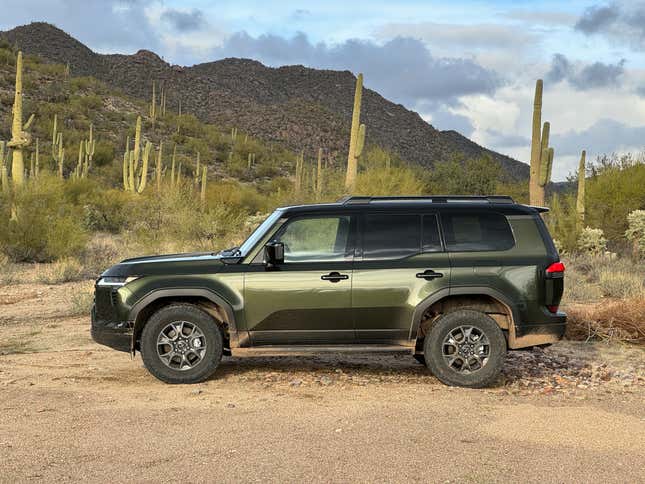
On the road I’m struck by just how quiet the GX is, especially considering its boxy silhouette and flat, upright windshield and greenhouse. There’s barely any wind noise even from the large side mirrors, and I don’t hear any tire roar until highway speeds, and even then it’s minimal. The steering is light and quick without being too twitchy, and there’s way less body roll than in the old GX. No matter what wheel size you go for ride quality is impressive, particularly for a body-on-frame vehicle without air suspension.
But the best part of the driving experience is the seating position and visibility. For a deeper dive into the GX’s seating position you can read my in-depth story, but the gist is that the new Lexus GX is as close to perfect as you can get this side of a Mercedes-Benz G-Class. Its scooped hood center and tall front fenders are ideal for both city driving and off-roading, and the driver sits high up without feeling like a bus driver. The GX has thin A-pillars and a low beltline, which really aids visibility, and the door panels have two different spots to comfortably rest your elbow. The side-view mirrors are weirdly shaped at first, taller and narrower than most SUVs, but I get used to them quickly — Lexus says they’re shaped so you can easily see both the ground and the roof of the GX.
Driving Over Trails In The Overtrail
When I arrive in Tucson dark clouds have been dumping rain on the desert, turning the tougher of Lexus’ three off-road courses into a muddy mess that sadly Lexus does not let us play in. On the remaining two courses, which are set up at White Stallion Ranch bordering Saguaro National Park, I barely scratch the surface of the GX’s off-road capabilities, but it’s fun and enlightening nonetheless. The trails consist of some fairly steep climbs, large dips and bumps, muddy puddles and obstacles like gigantic hundred-year-old cacti and cows with huge horns.
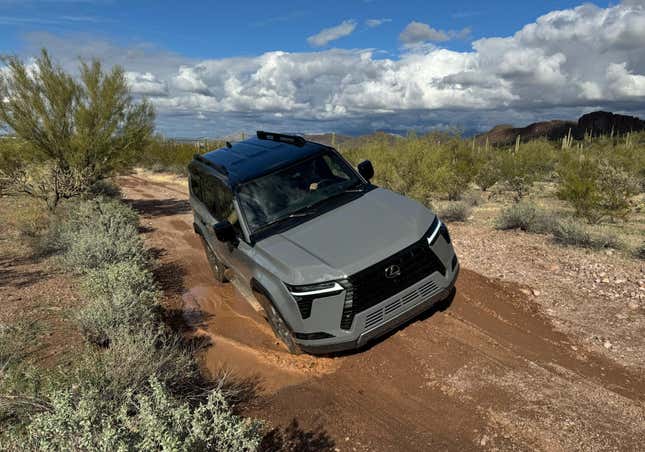
For the off-roading sections we hop into the Overtrail, a new-to-Lexus trim level that is aimed at overlanders and other GX customers that will actually take their SUVs off road, probably on trails just like these. Visually differentiating the Overtrail are unique exterior colors, a black roof, tucked-in bumper corners, green suede interior accents, fender flares that add almost an inch to the GX’s width, and 18-inch wheels wearing 33-inch Toyo Open Country all-terrain tires. The Overtrail ditches the GX’s third row, but Lexus says that could become an option if the demand is there.
Mechanically the Overtrail gets you an aluminum front skid plate, adaptive dampers, a wider track, an electronic locking rear differential in addition to the standard limited-slip center diff, and Lexus’ E-KDSS suspension system that features front and rear stabilizer bars that can be locked or unlocked either automatically or on-demand. The Overtrail also gets off-road camera views, hill-descent control, a new off-road Crawl Control feature, and additional drive modes that include Auto, Deep Snow, Dirt, Mud, Sand and Rock.
The instructor tells us to put the GX in low range for a lot of the trail, which is honestly unnecessary but the only way to engage Crawl Control. Working kind of like an off-road cruise control system, Crawl Control works in forward or reverse at five driver-selectable speeds, and it can be overridden by hitting the gas or the brake. Crawl Control optimizes power delivery and braking for maximum grip and minimal chassis movement, and I find that it takes a lot of the stress and effort out of low-speed off-roading, especially for a relative newbie like myself.
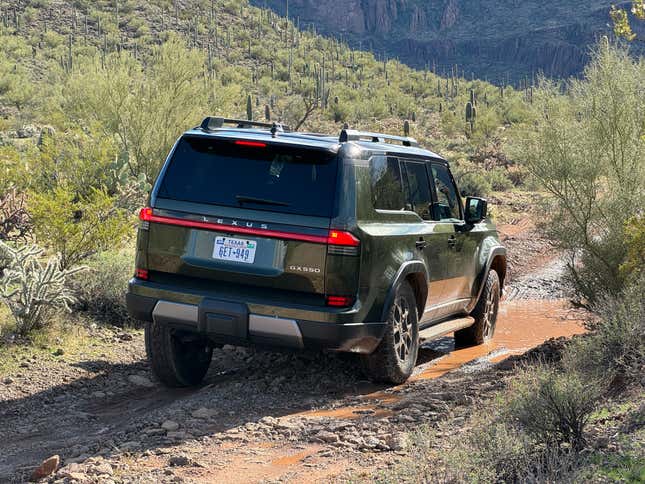
Overall the GX is smooth and easy to drive off the beaten path. The surround-view cameras project a simulated view of the terrain underneath the GX along with specific views of the wheels, so even in situations with bad visibility it’s not hard to navigate around obstacles. I don’t experience any unsettling body movements or have the steering wheel get jerked around, and the ride quality is always pretty good no matter what surface I’m driving over. Even on sections designed to show off the GX’s articulation it feels totally stable and sure-footed. In Overtrail spec the new GX’s approach angle is up by 5 degrees while the departure and breakover angles are each improved by 1 degree, and at 10.9 inches the ground clearance has been increased by nearly 3 inches.
At launch Lexus is offering more than 100 accessories from around 30 different brand partners through its Associated Accessory Products (AAP) catalog. Everything from roof tents and dog beds to off-road recovery gear and slide-out coolers are available from the factory — these accessories are all found on the online configurator and can be pre-installed by dealerships before delivery, all with a factory warranty. Lexus knows that GX owners modify their SUVs, and this is a smart way to capitalize on it.
More Bang For Your Buck
The 2024 GX 550 starts at $64,250 (including $1,350 for destination) for the entry-level Premium trim, while a fully loaded Luxury+ or Overtrail+ model will run you close to $85,000. We’ve got a full breakdown of pricing and features here, but no matter what trim you choose the GX comes very well equipped. Every 2024 GX has heated and ventilated front seats, a sunroof (an electrochromic panoramic one comes on the top trim), a power tailgate, power-folding mirrors, a tow hitch receiver and a tow mode.
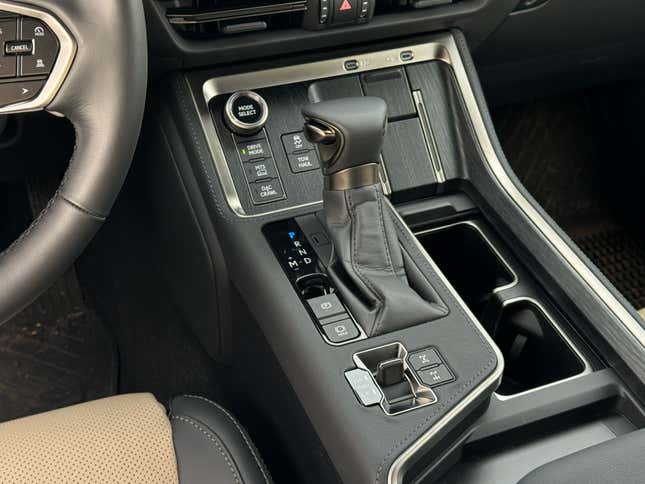
Adaptive cruise control, automated emergency braking with pedestrian detection, automatic high beams, blind-spot monitoring, lane-departure warning with steering assist, lane tracing assist, parking assist, rear cross-traffic alert and road sign recognition are all standard. Every trim except the base model also gets a 360-degree camera system and LED foglights, and every trim is available with Lexus’ Traffic Jam Assist system.
The Ford Bronco and Jeep Wrangler might have the GX beat on outright off-road capability, but both are a far cry from the GX’s overall usefulness and on-road manners. A four-door Land Rover Defender with the inline-6 will run you at least $73,000 to start, while the Mercedes-Benz G-Class is twice the price of the GX. Unibody competitors like the Jeep Grand Cherokee and the BMW X5 might be similarly priced and better for city driving, but none can match the GX’s cool factor and overlanding potential. And for those who don’t want all the luxury stuff and are looking for a cheaper price point, the GX’s Land Cruiser sibling will probably be the SUV for you.
Regardless of the competition, the 2024 Lexus GX feels like a major win. It has fantastic styling, a much-improved interior, desirable features, up-to-date tech and upgraded performance, all in a more practical package with a reasonable pricetag attached. If it can win over a GX skeptic like me, I’m sure the new GX will be the ideal vehicle for both longtime fans and brand newcomers. Make mine Nori Green, please.
